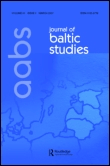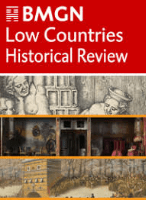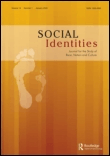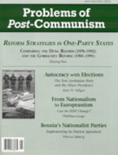
JOURNAL OF BALTIC STUDIES
Scope & Guideline
Illuminating Interdisciplinary Insights into Baltic Studies
Introduction
Aims and Scopes
- Interdisciplinary Research on Baltic Societies:
The journal emphasizes interdisciplinary approaches, integrating perspectives from history, sociology, political science, and cultural studies to explore the multifaceted nature of Baltic societies. - Focus on Historical Narratives and Memory:
A significant area of research includes the examination of historical narratives, collective memories, and the legacies of Soviet and post-Soviet experiences in the Baltic states. - Political and Economic Studies:
The journal explores the political dynamics, governance structures, and economic transformations within the Baltic states, particularly in relation to EU integration and transnational relationships. - Cultural Identity and Representation:
A key focus is on the exploration of cultural identity, national narratives, and the representation of minority groups within the Baltic context, including gender, ethnicity, and migration. - Contemporary Social Issues:
The journal also addresses contemporary social issues, such as social welfare, public policies, and the impacts of crises (e.g., COVID-19) on Baltic populations.
Trending and Emerging
- Impact of Globalization and Transnationalism:
Recent publications increasingly explore the effects of globalization and transnational connections, particularly how Baltic states navigate their identities in a global context. - Gender Studies and Feminist Perspectives:
There is a rising trend in research that examines gender roles, women's representation, and feminist critiques in the Baltic context, indicating a growing emphasis on gender studies. - Environmental and Sustainability Issues:
Emerging themes include discussions around environmental governance, climate change, and sustainability initiatives within the Baltic region, reflecting global concerns. - Digital Transformation and Innovation:
Research on digitalization, e-governance, and the impact of technology on society and culture in the Baltic states has gained traction, highlighting the region's adaptation to modern challenges. - Memory Politics and Historical Reckoning:
There is an increasing focus on memory politics, particularly regarding the Holocaust, Soviet legacy, and how these histories are remembered and represented in contemporary society.
Declining or Waning
- Historical Analysis of Pre-20th Century Baltic History:
Research focusing on the medieval or early modern history of the Baltic region has decreased, suggesting a shift toward contemporary issues and post-Soviet studies. - Traditional Ethnographic Studies:
There appears to be a waning interest in traditional ethnographic studies that focus solely on rural or folk practices, as contemporary cultural analyses take precedence. - Simplistic Nationalist Narratives:
The journal has moved away from simplistic narratives that solely promote nationalistic perspectives, reflecting a broader trend towards more complex, nuanced discussions of identity.
Similar Journals

Scandia is a distinguished academic journal dedicated to the field of history, published by SCANDIA in Sweden. With its origins dating back to 1976, the journal offers a platform for scholarly discourse, focusing on various historical perspectives and methodologies. Although currently not recognized as an Open Access journal, it fosters a rich exchange of ideas and original research, appealing to historians, researchers, and students alike. Operating within the Q4 quartile of its category for 2023, Scandia holds a significant position in the history landscape, ranking at #1627 out of 1760 in Scopus, representing the 7th percentile. With a commitment to quality scholarship, Scandia encourages contributions that challenge existing narratives and contribute to the broader understanding of historical contexts.
Please send your submissions or inquiries to the editorial office at Historiska Inst, Box 2074, Lund 220 02, Sweden.

Slovo
Navigating the Dynamic Landscapes of Slavic ScholarshipSlovo, published by the University College London, School of Slavonic & East European Studies, is a vital scholarly journal dedicated to the exploration of Slavic languages and cultures, as well as the broader social sciences and humanities. Established with a commitment to advancing academic discourse, Slovo serves as a platform for researchers, professionals, and students interested in the dynamic intersections of literature, history, and cultural studies within Slavic and Eastern European contexts. Although it holds a Q4 ranking in both the Arts and Humanities and Social Sciences categories, the journal’s emphasis on fresh perspectives often invites innovative contributions that challenge conventional narratives. While lacking an Open Access option, Slovo remains integral for those seeking to navigate its multifaceted terrain, ensuring that emerging scholars and established academics alike can engage with rigorous research from 2012 to 2023 and beyond. With its headquarters in London, United Kingdom, this journal not only reflects the rich heritage of its academic lineage but also fosters a vibrant community committed to the exploration of Slavic and East European studies.

MEXICAN STUDIES-ESTUDIOS MEXICANOS
Fostering Insight into Latin America's Cultural LandscapeMEXICAN STUDIES-ESTUDIOS MEXICANOS, published by University of California Press, is a distinguished journal that explores critical issues in the fields of cultural studies and history, with a keen focus on Mexican and Latin American contexts. Established in 1985, this journal serves as an invaluable platform for researchers, professionals, and students alike, aiming to deepen understanding of Mexico's complex social, cultural, and historical landscapes. With an impressive placement in the Q2 category in both Cultural Studies and History, it ranks within the top tiers of scholarly discourse, demonstrating a strong impact factor that reflects its significance in the academic community. Although it does not currently offer Open Access, the journal remains committed to delivering high-quality, peer-reviewed research that stimulates ongoing debates and enriches scholarship in the humanities and social sciences. Nestled at the heart of scholarly conversations, MEXICAN STUDIES-ESTUDIOS MEXICANOS continues to play a pivotal role in advancing academic inquiry into Mexico's past and present.

BMGN-The Low Countries Historical Review
Unveiling Diverse Perspectives on the Low Countries' PastBMGN-The Low Countries Historical Review, published by the KONINKLIJK NEDERLANDS HISTORISCH GENOOTSCHAP, is a distinguished open-access journal dedicated to the study of the history of the Low Countries, offering insights and diverse perspectives on historical developments from the region. With an ISSN of 0165-0505 and an E-ISSN of 2211-2898, this journal has been a valuable resource since its inception in 1970, with its rich archive covering pivotal years including 1975 and periods from 1999 to 2002, as well as the continuous series since 2009. With a notable impact factor supporting its reputation—scoring a commendable Q3 in History and achieving the 85th percentile rank within the Arts and Humanities category—BMGN is instrumental in fostering scholarly dialogue and advancing historical discourse. The journal's open-access format ensures broad access to its content, supporting researchers, professionals, and students keen to explore the intricate tapestry of Low Countries history. With its office located in The Hague, Netherlands, BMGN continues to be a pivotal forum for historical engagement and publication.

LATIN AMERICAN RESEARCH REVIEW
Fostering innovative research in the heart of Latin America.LATIN AMERICAN RESEARCH REVIEW, published by Cambridge University Press, is a premier open-access journal dedicated to advancing scholarship in the field of Latin American studies. Established in 1970, the journal has consistently evolved to address critical interdisciplinary issues, encompassing a broad spectrum of topics from anthropology and cultural studies to economics and political science. With its strong impact reflected in 2023's quartile rankings, including Q1 in both Cultural Studies and History, LATIN AMERICAN RESEARCH REVIEW ranks among the top-tier journals in multiple disciplines, capturing the interest of scholars worldwide. This journal not only fosters a deeper understanding of Latin America's diverse cultures, histories, and socioeconomic landscapes but also serves as a vital platform for innovative research and discussions. By offering open access since 2017, it ensures that its valuable contributions are widely disseminated, making it an indispensable resource for researchers, professionals, and students alike who are looking to engage with contemporary Latin American issues.

Social Identities
Navigating the Nuances of Social Structures and IdentitiesSocial Identities is a distinguished academic journal published by Routledge Journals, Taylor & Francis Ltd, dedicated to advancing the understanding of social identities from a multidisciplinary perspective. With an ISSN of 1350-4630 and an E-ISSN of 1363-0296, this journal stands out in the sociology and political science disciplines, as evidenced by its impressive Q2 ranking and a Scopus percentile of 64th. Spanning from 1995 to 2024, it continually fosters scholarly discourse on the complexities of identity formation, representation, and the interplay between various social dynamics. Although the journal currently does not offer Open Access options, it remains a valuable resource for researchers and professionals seeking in-depth analysis and critical insights. Based in the United Kingdom, Social Identities is a vital platform for both emerging scholars and established experts dedicated to exploring the nuances of how identities shape social structures and experiences.

Annee du Maghreb
Advancing Knowledge of North African NarrativesAnnée du Maghreb, published by CNRS Éditions, is an esteemed open-access journal dedicated to advancing the study of Mediterranean and North African cultures, history, and societies. Since its inception in 2004, the journal has aimed to foster a deeper understanding of the complex socio-political dynamics, artistic expressions, and historical contexts of the Maghreb region. By providing a platform for rigorous research and interdisciplinary dialogue, Année du Maghreb plays a pivotal role in enriching academic discourse and enhancing knowledge within the fields of anthropology, history, and cultural studies. Accessible to a global audience, this journal invites researchers, professionals, and students to contribute to its growing repository of scholarly work, ensuring the continuation of high-quality discussions pertinent to this vibrant area of study.

Soviet and Post Soviet Review
Decoding the socio-political narratives of a pivotal era.Soviet and Post Soviet Review is a prestigious academic journal published by BRILL, located in the Netherlands, focusing on the historical, sociological, and political dimensions of Soviet and post-Soviet societies. With the ISSN 1075-1262 and E-ISSN 1876-3324, this journal serves as a critical platform for researchers, professionals, and students interested in the complexities of social transformations in post-Soviet contexts. Considering its impact factor and Category Quartiles positioning—Q3 in History and Q4 in Sociology and Political Science—it is well-regarded in the academic community, showcasing high-quality, peer-reviewed articles that contribute to ongoing dialogues in these fields. The journal features a diverse array of research articles, reviews, and critical essays, fostering an understanding of historical narratives and contemporary challenges within the region. With a publication history that dates back to 1974, the Soviet and Post Soviet Review remains a vital resource for those seeking in-depth insights into the socio-political landscapes shaped by Soviet legacies and their ongoing implications.

PROBLEMS OF POST-COMMUNISM
Analyzing the Legacy and Future of Post-CommunismPROBLEMS OF POST-COMMUNISM is a distinguished academic journal focused on the critical examination of political, social, and economic transformations in post-communist societies. Published by Routledge Journals, Taylor & Francis Ltd, this journal features an ISSN of 1075-8216 and an E-ISSN of 1557-783X. With an impressive ranking of Q2 in the fields of Sociology and Political Science, and a Scopus position of #290/1466 (80th percentile), it stands as a vital resource for researchers and practitioners alike. The journal spans a convergence of years from 1996 to 2024, offering a rich archive of scholarship. Although it does not currently provide open access options, its rigorous peer-reviewed articles delve into the intricate dynamics shaping post-communist states, making significant contributions to contemporary academic discourse. Addressed to an audience keen on understanding the societal shifts and challenges facing these regions, PROBLEMS OF POST-COMMUNISM is essential for anyone seeking insightful analyses and robust dialogue in this evolving field.

Si Somos Americanos-Revista de Estudios Transfronterizos
Championing Innovative Research in Social SciencesSi Somos Americanos - Revista de Estudios Transfronterizos, published by UNIV ARTURO PRAT, is a distinguished open-access journal that has been serving the academic community since 2012. Based in Chile, this journal provides a platform for groundbreaking research in the fields of Cultural Studies, History, and Social Sciences, achieving remarkable rankings with a Q1 classification in both Cultural Studies and History as of 2023. Its contributions have garnered a notable presence, sitting in the 86th percentile in Arts and Humanities and maintaining strong engagement within its field. Spanning a converged period from 2019 to 2024, the journal aims to foster interdisciplinary dialogue that challenges traditional boundaries and promotes understanding of transborder issues. The journal's commitment to open access ensures that its research is readily accessible, allowing for greater dissemination of knowledge among students, researchers, and professionals alike. With an ISSN of 0718-2910 and an E-ISSN of 0719-0948, Si Somos Americanos stands as a crucial resource for anyone invested in the dynamics of cultural and historical studies in a transnational context.